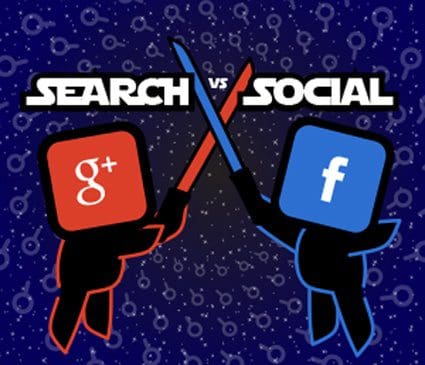
The Future of Social Search
 Consider the following developments: The most popular search engine creates a social media platform. A little over a year later, the most popular social media platform creates a search engine. Its not hard to recognize the innate competition between Google and Facebook. The end goal it seems is for one of these two companies to solidify itself as the primary user portal into the internet. When thinking about how you use social media, whether part of your online branding strategy or just a casual user, this is something that should spark your interest.
Consider the following developments: The most popular search engine creates a social media platform. A little over a year later, the most popular social media platform creates a search engine. Its not hard to recognize the innate competition between Google and Facebook. The end goal it seems is for one of these two companies to solidify itself as the primary user portal into the internet. When thinking about how you use social media, whether part of your online branding strategy or just a casual user, this is something that should spark your interest.
Surely this battle can’t be a winner-take-all situation. Facebook has amassed an uncanny amount of information over users, including billions of photos and a mile long laundry list of personal interests. Meanwhile, Google has indexed 30 trillion unique web pages across 230 million sites. So while both companies gravitate towards each other in strategy, it is unlikely either will soon overtake their counterpart in their respective strengths.
Google+ launched in July of 2011, and steadily grew its user base to 343 million by the end of 2012. They have nicely incorporated their new social media platform into an existing Gmail user base, and also linked Google+ data to Google search results. While average time spent on Google+ doesn’t compare to that of Facebooks, the future holds plenty of opportunity to close that margin as Googles social platform is still defining its strengths.
Facebook recently launched Graph Search in an effort to cash in on the huge amounts personal data they have been collecting for almost a decade. The move clearly indicates Facebooks intent to challenge Googles dominance in the realms of search engines. However, during the product unveiling Facebook founder Mark Zuckerburg made it a point to mention Graph Search was not a search engine, but a more precise method of searching within your social network. In later discussions Zuckerburg indicated that there indeed was the possibility that with advertising, Graph Search could turn a profit for the social media monolith.
Facebooks strengths are founded upon social concepts that have evolved into a business as a way to please and impress shareholders. Google has always known how to make money off their product, but have recently concerned themselves with how to become moresocial. Facebooks new venture relies on whether its existing cache of user data contains enough information to support a relevant search engine. Googles move hinges upon their ability to create social behavior and higher amounts of user engagement within their existing platform.
Critics scolded Googles initial attempts at a social network, just as Facebook users seem to always complain about any dynamic change in their social homepage. As the worlds of social and search converge, these two internet giants will surely persist, finding a sustainable long term niche in either direction. Whether you’re siding with Facebook or Google, its probably prudent to reconsider your stance and keep connected concerning the latest news in the struggle to offer the ultimate web tool hybrid the social media search engine.